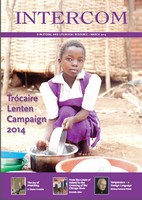 March 2014 issue
March 2014 issue
Click on link to view Intercom March contents
Editorial and Newsletter resources
Feature Article
The Joy of Preaching by Fr Shane Crombie (pdf)
The Joy of Preaching
Dialogue needs a channel. The principle affirmation of Revelation is that God has spoken to his people in Christ. The Good News has been brought to us and the gospel is made known by the preached word. Pope Francis observes, in the apostolic exhortation Evangelii Gaudium, ‘the homily takes up once more the dialogue God has already established with His people’. (EG, 137) Preaching is a channel that facilitates the dialogue.
As a communication activity, preaching is unique. Not only does it use what human language can express and understand, but it also expresses the transcendent message of the gospel. At the heart of the process stands the preacher, whose role is none other than to make the reality of this dialogue known in a given time and space. Preaching has three basic elements; it is an act of proclaiming, of teaching, and of encouragement, all three combining to keep the divine/human exchange alive and active.
The word used most frequently for preaching in the New Testament is kērussein – ‘to proclaim’; it is from this that the term ‘kerygma’ comes.[1] The gospel is to be proclaimed to all creation, following the injunction of Christ before ascending to the Father (Matt 28:19). The First Letter of John begins with the author stating that ‘what we have seen and what we have heard’ (1 John 1:1) is the source and content of the message to be proclaimed. Apostles emerged into the street on the morning of Pentecost proclaming the Resurrection, by the power of the Holy Spirit. The Acts of the Apostles narrates how the Good News, spread by the preaching of the followers of Christ, reached the ends of the earth. Even when dispersed by persecution, the followers of Jesus proclaimed the faith effectively. The Good News continues to be procalimed by the word and actions of those who share in the preaching ministry. The second element is teaching.
The technical word in the New Testament for teaching is didaskein. The term is used almost a hundred times and means, ‘to instruct by means of discourse with others.’[2] An essential aspect of the New Testament’s presentation of the role of the preacher is as teacher of the faith. Jesus was a teacher. One of the most common titles attributed to him in the Gospels is rabbi – ‘teacher’.[3] The Acts of the Apostles concludes with Paul under house arrest in Rome, noting that ‘he welcomed all who came to visit him, proclaiming the kingdom of God and teaching the truth about the Lord Jesus Christ’ (Acts 28:31). After proclamation led to accepting the faith, it was necessary to learn more about what is now believed.
The homily is not intended as a workshop on faith, rather it is a liturgical act of worship. A preacher does not stand in front of a classroom and teach. A preacher is a person of faith, talking to other people of faith, in faith. The teaching role of preaching is not simple didactic instruction, but an invitation to grow deeper in knowledge of the things that have been revealed. American theologian, Kathy Hilkert describes this aptly as ‘naming grace’. Preachers are called to put words on things that can remain in abstraction, to point out where God is, in the joys and the struggles of existence. Like Jacob, a preacher is called to look at situations as and say ‘truly God is in this place, and I did not know it’. (Gen 28:16) Such a privileged responsibility helps preachers to play a third role; to encourage.
Encouragement is a key attribute of Christian leadership. Saint Paul, in the Letter to the Romans, asserts he wants to go to Rome ‘to strengthen’ the community (Rom 1:11). Preaching is an act of faith that encourages, it builds up what is broken, and gathers what is scattered. This element can often prove to be the most challenging. Sunday after Sunday, funeral after funeral, wedding after wedding, those engaged in the preaching ministry are called to name grace, to point out God’s presence, even in the most unlikely of places. Preaching requires both faith and energy, and the ups and downs of life can sullen the luster of this great ministry. Pope Francis, in this regard, lends great encouragement: ‘Jesus loves you: he gave his life to save you: no he is living at your side every day to enlighten, strengthen and free you.’ (EG, 164) The preacher’s vocation, in the words of Isaiah, is to: ‘strengthen all weary hands, steady all trembling knees’. (Isa 35:3) In doing so, the preacher is also encourged, by the faith he himself helps to nourish.
Preaching is at the very core of the Church’s life and mission. In this inestimable ministry the preacher has the privilege of being intimately part of the joyful canticle of love between the Father and His children. ‘The joy of the Gospel fills the hearts and lives of all who encounter Jesus.’ (EG, 1)The Pope’s simple and stirring words remind all engaged in this ministry of the end goal – the unsurpassable joy of knowing the Lord.
To view a video interview with Fr Shane Crombie, please click here.
Fr Shane Crombie
Tullamore Parish
[1] Robert Waznak, An Introduction to the Homily (Collegeville: The Liturgical Press, 1998), 32.
[2] Waznak, 40.
[3] Ibid.
Intercom
Intercom is a pastoral and liturgical resource magazine published by Veritas, an agency of the Irish Catholic Bishops Commission on Communications.
There are ten issues per year, including double issues for July-August and December-January.
For information on subscribing to Intercom, please contact Ross Delmar (Membership Secretary):
Tel: +353 (0)1 878 8177 Email: [email protected]

